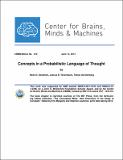| dc.contributor.author | Goodman, Noah D. | |
| dc.contributor.author | Tenenbaum, Joshua B. | |
| dc.contributor.author | Gerstenberg, Tobias | |
| dc.date.accessioned | 2015-12-10T18:45:00Z | |
| dc.date.available | 2015-12-10T18:45:00Z | |
| dc.date.issued | 2014-06-14 | |
| dc.identifier.uri | http://hdl.handle.net/1721.1/100174 | |
| dc.description | Note: The book chapter is reprinted courtesy of The MIT Press, from the forthcoming edited collection “The Conceptual Mind: New Directions in the Study of Concepts” edited by Eric Margolis and Stephen Laurence, print date Spring 2015. | en_US |
| dc.description.abstract | Knowledge organizes our understanding of the world, determining what we expect given what we have already seen. Our predictive representations have two key properties: they are productive, and they are graded. Productive generalization is possible because our knowledge decomposes into concepts—elements of knowledge that are combined and recombined to describe particular situations. Gradedness is the observable effect of accounting for uncertainty—our knowledge encodes degrees of belief that lead to graded probabilistic predictions. To put this a different way, concepts form a combinatorial system that enables description of many different situations; each such situation specifies a distribution over what we expect to see in the world, given what we have seen. We may think of this system as a probabilistic language of thought (PLoT) in which representations are built from language-like composition of concepts and the content of those representations is a probability distribution on world states. The purpose of this chapter is to formalize these ideas in computational terms, to illustrate key properties of the PLoT approach with a concrete example, and to draw connections with other views of conceptual structure. | en_US |
| dc.description.sponsorship | This work was supported by ONR awards N00014-09-1-0124 and N00014-13-
1-0788, by a John S. McDonnell Foundation Scholar Award, and by the Center
for Brains, Minds and Machines (CBMM), funded by NSF STC award CCF - 1231216. | en_US |
| dc.language.iso | en_US | en_US |
| dc.publisher | Center for Brains, Minds and Machines (CBMM) | en_US |
| dc.relation.ispartofseries | CBMM Memo Series;010 | |
| dc.rights | Attribution-NonCommercial 3.0 United States | * |
| dc.rights.uri | http://creativecommons.org/licenses/by-nc/3.0/us/ | * |
| dc.subject | Human Knowledge | en_US |
| dc.subject | Development of Intelligence | en_US |
| dc.subject | Probabilistic Language of Thought (PLoT) | en_US |
| dc.subject | Computational Neuroscience | en_US |
| dc.title | Concepts in a Probabilistic Language of Thought | en_US |
| dc.type | Technical Report | en_US |
| dc.type | Working Paper | en_US |
| dc.type | Other | en_US |
